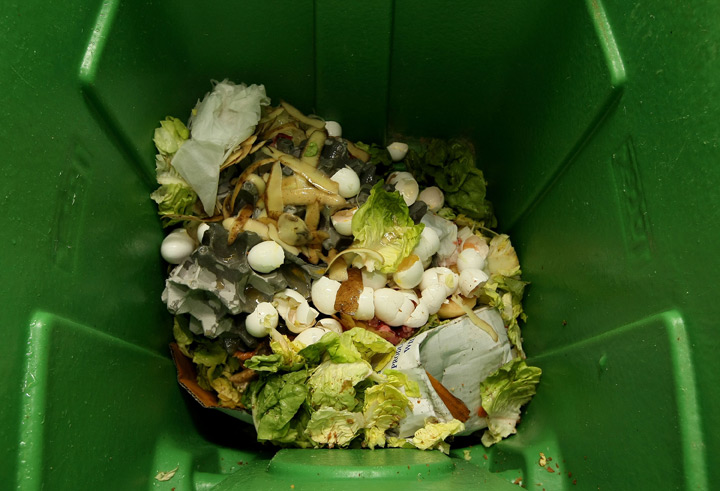Composting and collecting kitchen scraps, once the province of those with gardens or space for a big, pungent, outdoor composter, is now being embraced by a growing number of apartment-dwellers.

The trend has been helped along by the development of small composters and organic waste bins designed to be short on size and odours and long on environmental impact. Some are even sleek and stylish.
READ MORE: How to compost if you live in an apartment or condo
A growing number of cities offer pickup or drop-off options for compost and food scraps, which make up an estimated 14 per cent of the waste stream nationwide, according to the U.S. Composting Council. “Five years ago there really wasn’t much, but now lots of communities have options,” said Leanne Spaulding of the Bethesda, Maryland-based organization.
Almost 300 U.S. municipalities have food-waste collection programs and over a hundred others have community-based programs, she said. Many more have drop-off sites for food waste or compost.
For those who want to start composting in their homes, the cheapest method is vermicomposting, which can be done in a small container using, yes, worms.
“It sounds gross, but they can eat a half pound of fruit and vegetable bits, eggshells and coffee grounds a day, and if you manage the composter well you should forget it’s even there,” said Teddy Tedesco, project manager for the New York City Compost Project, hosted by the Brooklyn Botanic Garden.
- Invasive strep: ‘Don’t wait’ to seek care, N.S. woman warns on long road to recovery
- Ontario First Nation declares state of emergency amid skyrocketing benzene levels
- T. Rex an intelligent tool-user and culture-builder? Not so fast, says new U of A research
- Nearly 200 fossil fuel, chemical lobbyists to join plastic treaty talks in Ottawa
In a composter small enough for even the tiniest studio apartment, red wiggler worms, widely available online, process food waste, which is then cured and used to enrich soil. So long as the worms are not fed meat, dairy or grains, or kale, broccoli or cabbage, the odours are minimal, Tedesco said.
*Infographic by Global News
The New York City Compost Project, funded and managed by the city sanitation department, teaches communities about composting, offers technical support and sells inexpensive, apartment-friendly vermicomposters – basically small plastic containers topped with a screen or ventilated lid.
The general rule is 1 pound of worms per square foot of surface area of the composting bin. The resulting vermicompost (worm poop) is then moved to a separate container with a few holes punched in the lid to be cured, generally for about a week or so.
The nutrient-rich “soil amendment” produced by the little composters can be used to help feed houseplants as well as community trees and plants.

For those squeamish about sharing their home with worms and willing to spend a couple hundred dollars, a snazzy electric composter designed for small urban kitchens is also a possibility.
“These composters provide heat and continually move the compost, and the only organisms involved are the bacteria that are doing the decomposing,” Tedesco said. “Often they can include things like meat and dairy because they’re closed and use heat to help in the process.”
Electric composters generally include a mechanism that allows the processed food waste to fall to the bottom, where it cures before being used.
But for many apartment dwellers, collecting food waste in small, sealed, countertop containers to be picked up or dropped off and then professionally composted remains the easiest way to compost in a city.
“This is a great way of getting food waste out of landfills until you’re ready to begin composting at home,” Tedesco said.
The scraps can be kept for up to a week in an airtight countertop container or frozen, to further minimize odours, before being dropped off at a composting site.
“A lot of urban drop-off sites even request that the waste be frozen,” he said.
CompostNow, based in Raleigh, North Carolina, distributes its own bins in eight different cities and then collects them once a week, dropping off clean bins in their place. Food waste is then professionally composted, and participants can select which community garden or other recipient will get the compost.
The group’s website has a map of food-waste pickup and composting services across the United States.
“Every week someone is reaching out to us saying we want to start something like this where we live. I’ve gotten calls from as far away as Singapore and New Zealand,” said Justin Senkbeil, co-founder of the group.
“When you recycle a bottle, you feel good. But when you compost, you not only feel good, but can also see exactly where your compost is going and enjoy the results,” he said.




Comments